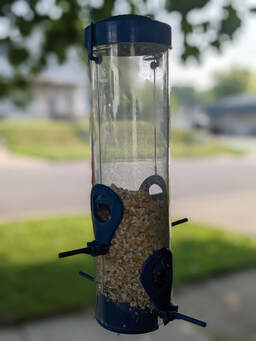 We have had a sparrow problem at our house for quite awhile. For as long as I can remember feeding the birds here, they have been coming to our feeders and flicking perfectly good seed everywhere into our flower beds. Sure, the mourning doves love it (and I love mourning doves), but a lot of times they just waste seed or eat entirely too much seed, leaving nothing for the other birds. But that’s only half of the problem when it comes to sparrows. They are aggressive, they travel in large packs, and to be honest, they’re kind of bullies. House sparrows are an invasive bird species, which means they are not native to North America. They were introduced here from Europe a long time ago, and since their introduction they have been thriving by killing off native birds and taking over their nesting sites. So, as an amateur birder, I hit the interwebs to try to figure out what options I had to manage our sparrow problem. Some of the sites suggested special feeders–I already had those. Others suggested cutting down shrubs and trees in the area–this wasn’t an option for us, as all of the shrubs and trees around us are not on our property, plus, I don’t really like removing stuff like this from the environment. But, by far, the predominant answer to our sparrow problem came in two short words: Feed them. The answer to our sparrow problem, the internet experts said, was to feed them. Feed the sparrows cracked corn–their food of choice–in a feeder and on the ground at least 15 feet away from other feeders. So I did. I hung a cheap feeder from a branch of the maple tree out front that was on our side of the property line, then filled it and the ground below with cracked corn. And the crazy thing is…IT WORKED! Like, immediately. The sparrows found their food…and some of the squirrels, bunnies, and chipmunks in the area did too. And just like that, all of my anger and agitation at these birds who never asked to be here in the first place–who were simply doing what they needed to do to survive–were gone. I wonder how many other things in life could simply be handled in the same way? I wonder how many irritations and frustrations could go away in an instant simply by tending to them or by bringing a lens of nurture and compassion to a person or a situation instead of anger and pettiness? That neighbor who never mows their lawn? Why not stop cursing them out in our heads and see if they need help with their lawn or their lawnmower? That coworker who is always the “overworked martyr,” claiming to have 200 reports to do when you mention that you have one? Why not stop rolling your eyes at them long enough to make them feel seen and heard, and then offer the suggestion that they let the boss know of their overwhelming workload, and offer to share with them your time management skills? Why not meet folx where they are instead of where we wish they were or where we want them to be, and just tend to their needs? That’s the thing with Jesus–our Teacher--he was always addressing situations of irritation, anger, and fear through the lens of Love. When townspeople and religious leaders had no problem chaining and restraining a man from the country of the Gerasenes with an “unclean spirit,” Jesus stepped in and addressed the powers that constrained him, and brought him back into relationship and community. When other Jews reviled the tax collectors like Matthew so much that they wouldn’t be in relationship with them, Jesus sat down and shared a meal with them. Time and again, Jesus saw the anger, the frustration, the irritation, and the fear of others and rather than jumping on the bandwagon or facing frustrations with force, or might, or division…Jesus responded in love. I don’t know about you, but I want to get better at that. I want to view all of the “sparrow situations” in my life through the same lens Jesus did. I want to lean in when my instinct is to push away. I want to build when my inclination is to tear down. I want to feed when all I can think to do is starve out. I have a ways to go in that endeavor–maybe you do too? I don’t know, but what I do know is that I am a better human because I am not being frustrated daily by these sparrows. I know that the sparrows are better because they are getting a favorite food and aren’t having to fight for it all of the time. And I know the rest of the birds are better because they aren’t being bullied at the feeder by the sparrows every time they try to come and eat. Which leads me to believe that Jesus may have been on to something by the ways he leaned into love in situations that were easy to be less than loving. Perhaps it's the only real way for us ALL to get a little better: By figuring out that feeding just one of us actually ends up feeding us all. So, as for me and my house, we will practice “considering the sparrows,” and I pray that you and your house might join me. Pr. Melissa 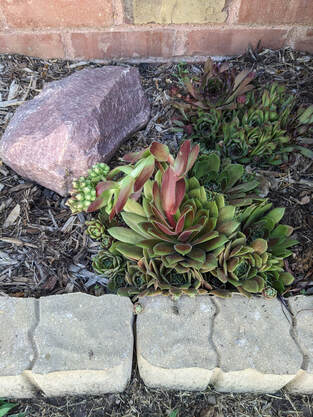 One of our "lost cause" hens and chicks getting ready to bloom. One of our "lost cause" hens and chicks getting ready to bloom. It was just a throw away pot of succulents that my spouse had "rescued" from a Walmart clearance shelf. The pot was a multi-tiered pot of hens and chicks and when they brought it home, I thought, "Oh great, just what we need, another lost cause." The pot sat inside for a few weeks until, one day, I came home and the pot was empty sitting on the counter by the kitchen sink. I figured our "lost cause" had finally decided to lose, so I went about my day. A little later on, I heard the water outside turn on, and went out to find my spouse planting the hens and chicks in an empty bed on the west side of the house. I asked what they were doing, and my spouse responded that as they began to take the pot apart, they saw how root bound the little hens and chicks had become. They were unable to grow and thrive any longer in the pot. They needed more room and better soil, and my spouse was going to ensure they had it. That was just under three years ago, and those throwaway hens and chicks from that cheap, tiered pot have not only not lost their cause, they have turned into an ABSOLUTELY gorgeous array of flowering succulents. In fact, that bed has become one of my favorite beds on our property, reminding me of my Grandma Katzer's bed of hens and chicks that she had when I was a child. That's the thing about "lost causes"--often they're only lost if we give up on them. Throughout his ministry, Jesus of Nazareth ran into a lot of "lost causes" --people whose families and communities and synagogues had written them off for some reason or another--because they were different, because they were sick, because they were "unclean" according to purity codes of the day, because they were female and outside of the many rules laid out for females at the time. Whenever Jesus ran across them, we read that not only did he not write them off, he "healed" them. Often times when we modern day readers hear the word "healed," we think "cured." But that wasn't what Jesus did at all. Healing them, "casting out their demons," wasn't about cure or magic or unicorns. It was about restoring them to community, to relationship, and to fullness of life. Jesus' entire ministry to "lost causes" was about removing the barriers each person had in front of them that kept them from being whole. It was never about taking away someone's disease, it was always about taking away the stigma of the disease and the segregation instituted by families and religious leaders that kept the person living with the condition from community and relationship. While entire communities and families wrote off people they knew and loved as lost causes, Jesus demonstrated how no one is truly "lost" unless we give up on them. And I don't mean converting them to Christianity either. I mean converting damaging systems and legal and religious strongholds that keep people separated, isolated, marginalized, and oppressed into places where people matter more than ideology. And into places where wholeness matters more than some generalized sense of "respectability." Our hens and chicks are living proof that a little attention and tender loving care are all many of us need to thrive and move from the clearance shelves of our lives into something BEAUTIFUL. In a very real way, we are all just one act away from healing, wholeness, and life--we just need someone to notice and give us more room and better soil in which to grow. Which begs the question, who or what aren't we yet noticing? Where are the "lost causes" in our midst? Learning to open my eyes and my heart with you, Pr. Melissa 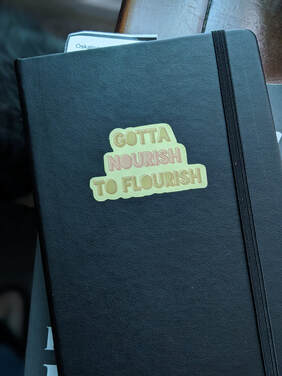 I'm a big fan of stickers. My old laptop had many of them on it that had either been given to me or were stickers I had purchased because they held some significance for me. My spouse knows how much I love stickers, and recently they gave me one that said simply, "Gotta Nourish to Flourish." For a long time, I wasn't sure where I would put such a sticker, until one day it dawned on me that the best place for this message to ring out into my life was my journal. So that's where I put it. On the front cover of my journal that--until Sunday night--I hadn't written in for over a month. The same journal that sat at one end of my desk at home while I worked or while I balanced our books. Or while I was talking on the phone or having a telehealth appointment. Now, I have journaled since I was about 11 or 12, and I have been sporadic in doing so at best. One might say that I am consistently sporadic at journaling, which may very well be the only consistency to be found in regard to my journaling practice. I am consistently inconsistent. And I think part of the reason is that I find it easier to nourish certain parts of my life than I do others. Maybe you can relate? At times I find it easier to throw myself into my church work than it is to actually tend to my spirit. I find it easier to numb feelings I don't want to feel with excessive food or excessive sleep than it is to journal about those feelings or talk them out with a friend to--at the very least--get them out. I find it easier to get caught up in my head--making grand plans and working out difficult things in my mind--than it is to turn my brain off of and get to work making a plan a reality. But just because I find it easier doesn't mean that it's working. Author Caroline Myss writes, "What drains your spirit drains your body. What fuels your spirit fuels your body.” In other words, just because we aren't tending our minds, our bodies, or our spirits, doesn't mean that we are not affecting them. Neglecting one, neglects the fullness of them all. Tending one, supports the fullness of them all. Our minds, our bodies, and our spirits do not exist in silos. They are connected. They are one. And for each of us to be more fully one ourselves, we must practice being attentive to each of them. We gotta nourish to flourish. I'm not talking about hitting the gym or forcing ourselves to sit down and write something on an empty journal page. I'm not talking about getting up at 4 AM and having "quiet time" with an open Bible and an hour of prayer. I'm talking about cultivating the soil of our lives in such a way that supports fullness of life. Not just in some next life, but here and now. I'm talking about practicing balance by intentionally looking at how we are spending our time and our days and seeing which places are being overnourished and which ones are being undernourished. And then being intentional about bringing those places into a better balance. I'm not some Pollyanna here, either. I know there are demands in life that require us to do certain things we don't necessarily want to do. I know there are deadlines to meet, and appointments to get to, and children to take care of, and laundry to fold, and dishes to wash, and gardens to weed. But perhaps the manner in which we approach these "have-to's" and the attention and intention we bring to each of them is the key to helping us to nourish and flourish in the lives we actually have. One of my favorite singer/songwriters is Quaker Folk Artist Carrie Newcomer. She has a song titled, "Holy as the Day is Spent," and I think it speaks to quiet ways we can bring attention and intention to even the most mundane aspects of our lives. Some of the lyrics are: Holy is the dish and drain, the soap and sink and the cup and plate, warm wool socks and the cold white tile, shower heads and good dry towels. And frying eggs sound like Psalms, with bits of salt measured in my palm. It's all a part of a sacrament, As holy as a day is spent. You can listen to the song by clicking here. Maybe I'm not the most consistent journaler around. I can live with that--so long as I am working everyday to becoming more attentive to the balance of my mind, body, and spirit. Not by adding more to my already impossible To-Do list, but by finding ways to nourish each of them as I work my way down my to-do list. In each moment. With each interaction. We gotta nourish to flourish--maybe that starts with nourishing the attention we are paying to our everyday lives. Learning to nourish and flourish with you, Pr. Melissa 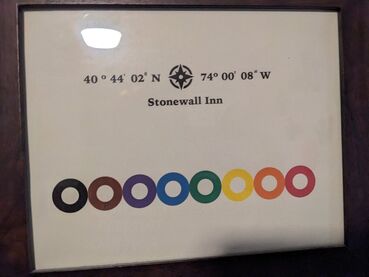 On a wall in our home in a frame are the coordinates to Stonewall Inn. In between the coordinates is a compass, and at the bottom of the page are circles made of rainbow colors. We were doing some work near this framed art piece the other day, and I couldn't help but stare at it. Even when I left its immediate vicinity, I couldn't shake the image in my mind. This morning, over a cup of coffee, I figured out why. It's Pride month, as many of you are likely aware, and it seems like this year I've heard a lot more hurtful rhetoric about it. I've read posts and articles from other Christians talking about how "pride is a sin" and how LGBTQIA+ folx "don't own the rainbow." This year my family and I have listened to lawmakers and commentators call our family inconsequential at best and, at worst, an abhorrent crime against God and humanity. And at the recent Pride festival the church had a booth at, protestors were once again present right across the street. Holding up signs with cherry-picked scripture passages on them, calling for repentance, and telling us "groomers" to go home. Most of the time this stuff doesn't bother me, but collectively, over time, perhaps without me even noticing it, it has had a cumulative effect on my soul and, I'm certain, the soul of others in the LGBTQIA+ community. There is a weariness present that I can't fully explain, and almost a feeling of being lost. Lost in a swirl of hate. Lost in fear. Just lost somehow--like I've lost my way somewhere in the middle of absorbing all of the blows from news media, social media, lawmakers, protestors, and "well-meaning" other Christians. Not to mention being the keeper of stories from so many who have been hurt by these same people. But if I was, in fact, lost, that picture in our home helped me get found again because it called me back to where and how Pride started. If you don't know, in June of 1969, the Stonewall Riots occurred after New York City police raided the Stonewall Inn, a gay club located in Greenwich Village in New York City. This led to 6 days of protests and is credited with birthing a more widespread LGBTQIA+ rights movement. In the years following the riots, bisexual activist Brenda Howard, bisexual activist Robert A. Martin, Jr. (known as Donny the Punk), and gay activist L. Craig Schoonmaker, helped popularize the word "pride" to describe a yearly commemoration of the Stonewall Riots, in part, because they brought national attention to the issues that queer people were facing (and still face today). What I came to understand was that when others are working SO HARD to control the narrative with lies and hate, that framed picture in our home points me back to the TRUTH. The truth, that love isn't a fight, but it IS something worth fighting for. The truth that scripture is full of descriptions of a God who created us to live FULLY. The truth that Pride as it is celebrated each June isn't a sin--it is a space for those of us who have been (and continue to be) hurt and told to be ashamed and made low to celebrate the FULLNESS of our humanity. The truth that we are not the first people to ever walk this road to liberation, and we will not be the last. In a very real way, that framed picture helped me find my center again, and it reminded me of the lyrics to one of my favorite hymns: Come and Find the Quiet Center, written by Shirley Erena Murray. I'll finish this blog post with the lyrics to the first verse of that only after I remind each and every one of you of this: Whatever has you feeling lost. Whatever has you feeling less than the fullness of your humanity. Whatever has left you feeling shame or made low--is NOT the truth. You may not be a person who is part of the LGBTQIA+ community, but you were no less made to live fully. So when the noise and the clamour and the hurt and the shame get too loud, my prayer is that you too would find your quiet center. And in that, you would find a peace that surpasses all understanding. And now, those lyrics (ALL of the verses are great, by the way): Come and find the quiet center in the crowded life we lead, find the room for hope to enter, find the frame where we are freed: clear the chaos and the clutter, clear our eyes, that we can see all the things that really matter, be at peace, and simply be. Finding the Quiet Center with you, Pr. Melissa |
Rev. Melissa Sternhagen
Rev. Melissa Sternhagen was called as the pastor of St. Paul Congregational UCC in June of 2020. Prior to her call to St. Paul, Pr. Melissa worked as a hospice chaplain in the Ames, IA area, following pastorates at rural churches in Central Iowa and Southern Illinois. Pr. Melissa is a second-career pastor with a background in agribusiness and production & supply operations. She received her M.Div. from Eden Theological Seminary in St. Louis, MO, and holds a MA Ed. in Adult Education and Training, and a BA in Organizational Communications. Archives
July 2024
Categories |
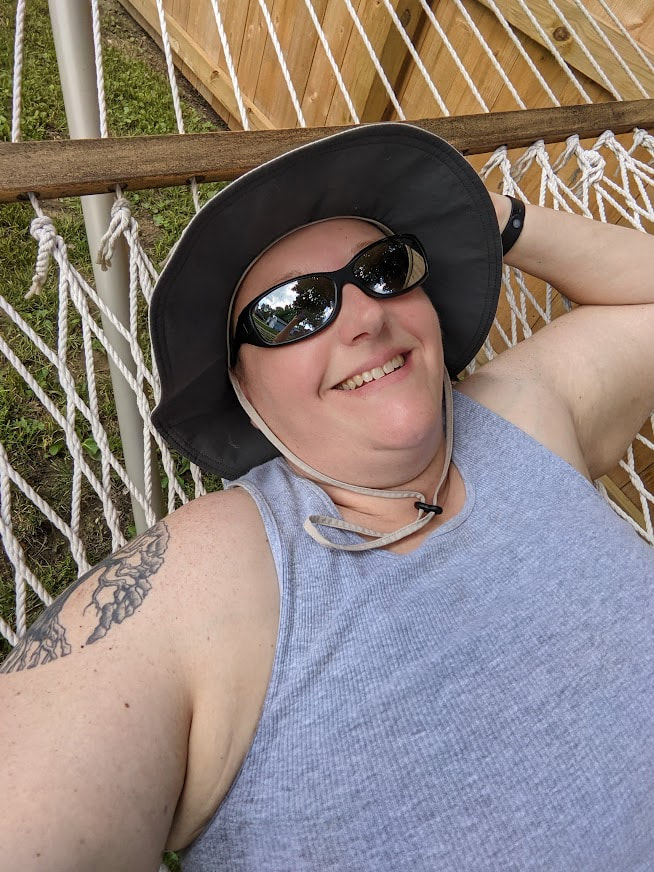
 RSS Feed
RSS Feed
